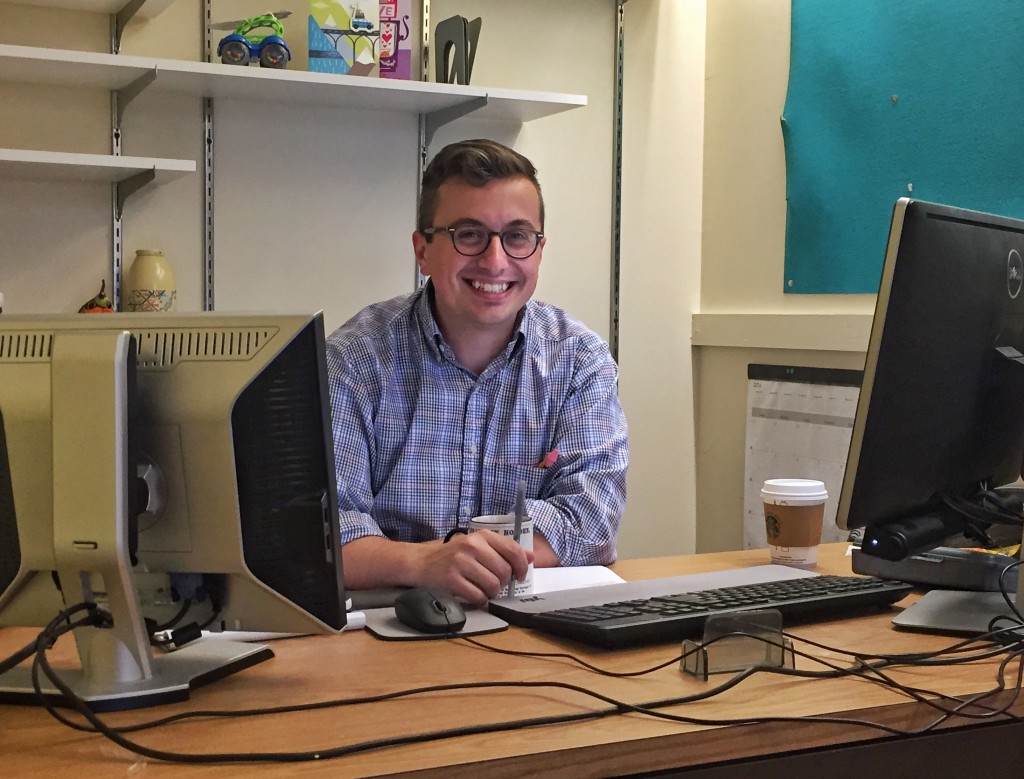Miles Shugar, graduated from UMB in 2014
Program Coordinator, Anthropology Department, UMass Boston
1. What is your position now; what do you do on a day-to-day basis?
I am the Program Coordinator for UMass Boston’s Anthropology Department. My duties are split between grants administration and internship coordination, though I have a host of related responsibilities. On any given day, I spend a good portion of my time attending meetings with faculty and staff regarding upcoming projects, deadlines, budgetary issues, and various other administrative situations. Another large chunk of my time involves helping to develop our nascent Public Anthropology Masters program (PAMA), specifically the mandatory internship portion during which our students will lend their anthropological skills to a community organization or institution. My role is to start conversations and grow relationships with community partners who would benefit from (and, in turn, be of benefit to) UMass Boston anthropology interns, and to act as a liaison between our students, the faculty, and the community. These tasks could take me all over the UMass campus as well as greater Boston on any given day, which altogether contributes to a sense of action and passion that I have fostered for this new position with my alma mater.
2. What is the most interesting project (field, lab, academic, or community) that you have worked on recently?
My time working for the Anthropology Department has been short thus far, as I only began my position at the beginning of July. Despite that, I feel as if I’ve experienced an exciting flurry of activity related to grants and the new PAMA program in my short two months. The Anthropology faculty have come together in a creative and collaborative way to usher in the PAMA, which will be the department’s second graduate program (the other being the Historical Archaeology MA). Related to that, a number of the faculty are actively engaged in or are planning to propose ambitious research projects with federal sponsors and results that will gather practical knowledge about how various social, political, health, and environmental factors tangibly affect health outcomes and quality of life for Bostonians and the greater Massachusetts population. I have had the privilege of sitting in on a few of the meetings related to PAMA and burgeoning research projects, and I have even had an opportunity or two to contribute input to the conversations in which they are being developed. For example, I recently participated in a meeting regarding an upcoming proposal to a federal health research institution where an interdisciplinary, inter-University team will gather ethnographic data from a spectrum of Boston’s Latino and Asian-American communities to determine what effects ethnic categorization has on public health outcomes. Since I became a resident of Boston five years ago, I have felt a need to become embedded within and familiar with a broader swath of the community than I would normally interact with as part of my daily routine. I began to achieve that goal in small part by volunteering with community organizations such as the Haley House, but more broadly, it is my hope that I can use my role as Program Coordinator to help connect the talents, skills, and research of UMass Anthropology to the publics that could benefit so much from them.
3. What is one thing that you remember specifically about your time at UMass?
I treasure my time as an MA student at UMass, both in terms of my professional and personal development. Being surrounded by a holistic department full of faculty, staff, and students collectively working towards the common goals of archaeological education and research was formative, and helped me realize what I wanted to do contribute to the field of archaeology, rather than what I wanted to gain from it. More specifically, I got the strong impression that the Fiske Center and the Historical Archaeology program were steering their projects towards a collaborative, community-based framework. With that sort of intention, the conversations that would occur throughout the labs and over meals throughout long days of cataloging and artifact processing were eye-opening. There was this sense of, “If we aren’t doing it for the public, or with our results and analyses accessible to and beneficial for the public, then what is the practical point of it?” In other words, it seemed that public archaeology was a given, and that the mindset of community as stakeholder and collaborator was entrenched.
4. What is the best advice you got (or wish you had gotten) in graduate school?
I remember how much anxiety I felt over picking a thesis topic—would it suit me? Could I finish it in time? I overheard someone saying, “It’s just your thesis—you don’t have to be in love with your topic, you just need to ask a question about a set of data and answer it to the best of your ability,” and that was sort of freeing. So in the end, I decided to pick one of the most arcane sites I had come across: a 19th century horse railroad depot in Roxbury, Boston, that I knew nothing about; generally, in terms of horse-drawn streetcar railroads of the 19th century, and specifically, in the ways that they helped structure the Boston that we have grown into today. I eventually fell in love with the topic anyway, as you might have guessed, but I’m glad I got out of the comfort zone of what I initially thought I was capable of being interested in! I think that as a new graduate student, I was worried that if I didn’t reinvent the discipline, I’d perish. But eventually I realized that we are stewards of the data, not the other way around, and that part of the fun of archaeology is playing with scale and the anthropological toolkit to see how different sites and data can be seen to have interesting and sometimes unintentional repercussions down through the years.

